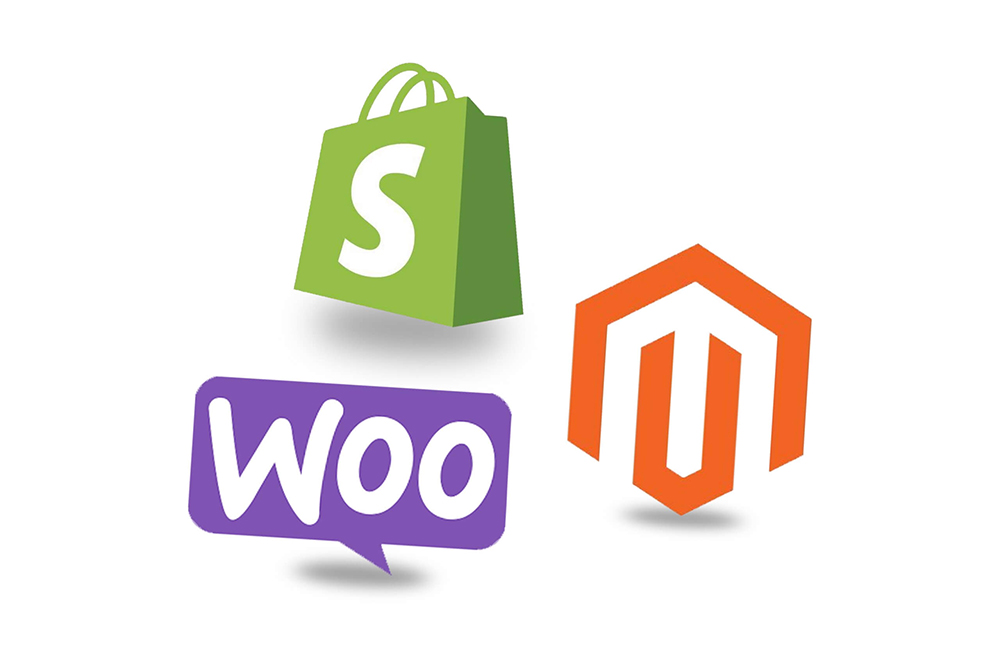In the ever-growing e-commerce market, choosing the right platform for your online store is essential. While Shopify has become a popular choice for many entrepreneurs, there are other alternatives worth considering.
In this article, we will compare Shopify, WooCommerce, and Magento (Adobe Commerce) to help you determine which platform best suits your e-commerce needs. Learn about the features, pricing, interface and pros and cons of each platform.
Introducing Shopify, WooCommerce, and Magento
To help you better understand these platforms, here is a quick overview of each of them:
Shopify: A user-friendly, all-in-one e-commerce platform

Shopify is known for its simplicity and ease of use, making it a popular choice for small businesses and those new to e-commerce. With an all-inclusive package that includes hosting, themes, and a wide range of apps, Shopify offers a seamless experience to get your online store up and running.
If you want to learn more about Shopify, read our full review of the e-commerce platform.
WooCommerce: A flexible e-commerce plugin for WordPress

WooCommerce is a versatile e-commerce plugin for WordPress, allowing you to add an online store to your existing website. Known for its flexibility and customization options, WooCommerce is perfect for those who have a WordPress site and want to maintain control over their online store.
Magento: A powerful, scalable platform for large businesses

Adobe Commerce (Magento) is a robust e-commerce platform built for large businesses with specific needs. Its advanced features and scalability make it ideal for enterprises that need a customizable solution to handle a high volume of products and customers.
Shopify vs WooCommerce vs Magento: Which Platform to Choose for Your E-commerce?

Shopify is renowned for its simplicity and ease of use, making it an ideal choice for small businesses and e-commerce beginners. With an all-in-one package, Shopify provides a seamless experience for launching an online store quickly.
Key features include :
- a user-friendly dashboard
- a wide range of apps for integration
- dropshipping capabilities
Woocommerce, on the other hand, is a versatile e-commerce plugin for WordPress. It offers flexibility and customization options, perfect for those with an existing WordPress site who want to maintain control over their online store.
Notable features include :
- seamless integration with WordPress
- access to thousands of plugins and extensions
- unlimited customization options
Magento is a powerful e-commerce platform tailored for large businesses with specific requirements. Its advanced features and scalability make it the go-to solution for enterprises needing a customizable platform to handle high volumes of products and customers.
Some of its standout features are :
- multi-store management
- customer segmentation
- powerful search functionality
Features and Capabilities: Shopify vs WooCommerce vs Magento

Let’s take a closer look at the features and capabilities offered by these three platforms:
Product and stock management:
Shopify: Simple and efficient product and stock management, with real-time inventory tracking.
WooCommerce: Product and stock management integrated with WordPress, with additional customization options thanks to extensions.
Magento: Advanced product and stock management, suitable for large companies with numerous products and stock management options.
Customization and design:
Shopify: Wide selection of professional and customizable themes, making it easy to create an attractive online store.
WooCommerce: Unlimited customization thanks to WordPress themes and extensions, offering total freedom to create a unique design.
Magento: Advanced customization and choice of themes, although the learning curve is steeper than other platforms.
Extensions and integrations available:
Shopify: Vast library of apps and integrations to extend the functionality of your store.
WooCommerce: Wide range of extensions and WordPress plugins to customize your e-commerce.
Magento: Numerous extensions available, although some can be costly and require technical skills to implement.
Pricing and Hidden Costs: Shopify vs WooCommerce vs Magento

Cost is a crucial factor when choosing your e-commerce platform. Here’s an overview of the pricing and hidden costs of each platform:
Pricing plans and hosting costs:
- Shopify: Offers three pricing plans (Basic, Shopify, and Advanced) with prices ranging from $29 to $299 per month. Hosting is included in the price.
- WooCommerce: Free plugin, but requires paid WordPress hosting. Costs vary depending on the chosen hosting provider.
- Magento: Free version (Magento Open Source) available, but hosting must be purchased separately. Magento Commerce, the paid version, starts at around $22,000 per year.
Transaction fees and other hidden costs:
- Shopify: Variable transaction fees depending on the chosen plan and the external payment provider used. Additional fees may apply for certain apps and extensions.
- WooCommerce: No transaction fees, but fees may be charged by payment gateways. Some additional extensions and features may also be chargeable.
- Magento: No transaction fees for the Open Source version, but additional costs may apply for extensions and development services.
Interface and Ease of Use: Shopify vs WooCommerce vs Magento

Ease of use is another crucial factor for online shop owners. Here’s a comparison of user interfaces and ease of use for each platform:
- Shopify: Intuitive and user-friendly interface, ideal for beginners and professionals. Users can easily navigate and manage their online store.
- WooCommerce: Integrates directly into the WordPress dashboard, which facilitates the transition for WordPress users. However, for beginners, there might be a slight learning curve.
- Magento: More complex interface than other platforms, requiring technical skills and some experience to be used effectively. May not be suitable for beginners.
Pros and cons of Shopify vs WooCommerce vs Magento

Each e-commerce platform has its own advantages and disadvantages depending on your needs and technical skills. Let’s take a look at the pros and cons of each platform in a comparison chart to help you decide.
Pros and Cons of Shopify
Pros
- Easy to use and quick setup
- Hosting included and 24/7 support
- Large app and integration library
Cons
- Transaction fees depending on the plan chosen
- Less customization compared to other platforms
- Additional costs for some apps
Pros and Cons of WooCommerce
Pros
- Maximum flexibility and customization
- No transaction fees
- Seamless integration with WordPress
Cons
- Requires separate WordPress hosting
- Learning curve for beginners
- Additional costs for some extensions
Pros and Cons of Magento
Pros
- Scalable solution for large businesses
- Advanced features
- Highly customizable
Cons
- High hosting and development costs
- Less customization compared to other platforms
- Requires advanced technical knowledge
Recap Table : Shopify vs WooCommerce vs Magento
Here is a recap table with ratings out of 5 for each platform’s features to help you compare their performances.
| Feature | Shopify | WooCommerce | Magento |
|---|---|---|---|
| Presentation | 4.5 | 4.0 | 3.5 |
| Platform choice | 4.0 | 4.0 | 3.0 |
| Functionality | 4.5 | 4.0 | 4.5 |
| Pricing and costs | 4.0 | 4.5 | 3.0 |
| Interface | 5.0 | 3.5 | 2.5 |
| Pros/Cons | 4.0 | 4.0 | 3.0 |
| Overall Rating | 4.5 | 4.0 | 3.5 |
Shopify: Ideal for small and medium-sized businesses
Shopify is the ideal platform for small and medium-sized businesses looking to quickly launch their e-commerce ventures. Its ease of use and user-friendly interface make it an attractive option for beginners and entrepreneurs who want to focus on their business rather than managing their online store.
WooCommerce: Perfect for WordPress users
WooCommerce is the best option for those who already have a WordPress site and want to add e-commerce functionality. Its flexibility and customization make it a solid choice for online store owners who want to create a unique site tailored to their specific needs.
Magento: Suited for large businesses with specific needs
Magento is the solution for large businesses with specific needs and advanced technical skills. Its power and scalability make it a wise choice for businesses that need to handle a large number of products and customers and require a robust, customizable solution to meet their ever-changing needs.
Conclusion
There is no one-size-fits-all answer to determine the best e-commerce platform between Shopify, WooCommerce, and Magento. Each offers Pros and Cons that may suit different businesses and needs.
Consider your technical skills, budget, business size, and growth objectives before making a decision. Weigh your options carefully and choose the platform that best fits your needs to ensure the success of your online store.
FAQ
Which platform is most beginner-friendly?
Shopify is generally considered the most beginner-friendly platform due to its ease of use and user-friendly interface.
Which of these platforms offers the best customer support?
Shopify is known for its excellent 24/7 customer support, making it a solid choice for those seeking reliable assistance.
Is it possible to migrate from one platform to another?
Yes, it is generally possible to migrate from one platform to another, although this may require the help of a developer or data migration expert.
Which platform is most secure for my e-commerce business?
All three platforms take security very seriously, but it is crucial to always follow the best security practices, such as regularly updating software and using reliable extensions and plugins.
